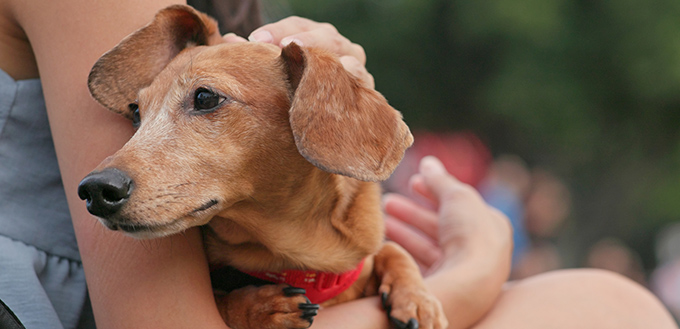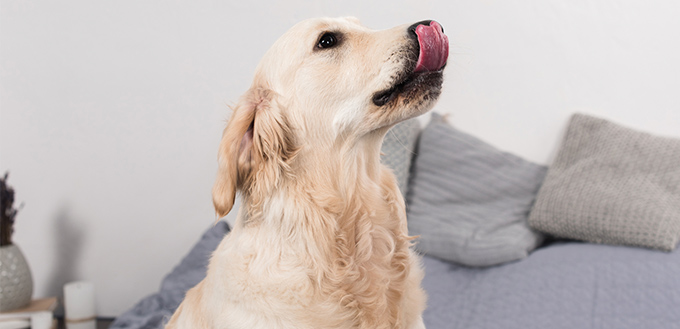Just as your Nana forgets her glasses are on her head and your Pop might confuse you with your sister, dogs can struggle with aging as well. As they have shorter lifespans, this can come sooner than you may expect. Some dogs have managed to live to the age of 32 years old, but most are doing well when they live to 12 or 13. It can be sad when they start showing signs of their age, but there is still a lot you can do for them to help, and the first step is knowing what the signs are.

Cognitive Dysfunction
If an old dog’s behavior changes, maybe their personality changes or they forget training they have been doing since they were a puppy, it can be easy to assume it is simply because they are getting older. This isn’t always the case. Many diseases, infections, and illnesses can also cause them to act strangely.
It is always worth checking with a vet if you have concerns about old dog behavior, especially as older dogs are also more likely to suffer from physical problems, such as hearing loss, that could also be a source of problems. Once medical problems are ruled out, you should consider the symptoms of cognitive dysfunction:
Confusion or Spatial Disorientation
Losing themselves on walks they have been on hundreds of times, getting confused by normal obstacles, and going to move through doorways at the hinge side, rather than the handle, are all signs their mind isn’t what it used to be.
Changes in Social Needs
Both extremes of social behavior can be a sign of old age in dogs. If your dog suddenly seems desperate for your attention and follows you from room to room, or if they lose their interest in your affection and play, they may be anxious or depressed about their confusion.
Increase in Repetitive Behavior
They also might be suffering from cognitive dysfunction if a senior dog’s behavior changes to become more repetitive. This might be to comfort themselves, or out of confusion. Examples of repetitive behavior include increased vocalizations, licking, and pacing, or eating more food and fixating on objects for long periods of time.
Related Post: Best Senior Dog Food

Apathetic Behavior
Older dogs might also draw into themselves. Depression, confusion, or tiredness may be behind this. Beyond losing interest in their old relationships, they may also groom themselves less often, eat less, and stop reacting to the activities around them.
Anxiety and Irritably
Dealing with the confusion that comes with cognitive dysfunction can be a very difficult experience for any dog to handle. This can make them lash out in anger, such as barking or snarling at you more often, restlessness, agitation, and behaving negatively as a consequence of separation from you or your family.
Broken Sleep Patterns
Tiredness during the day, more frequent naps and general lethargy may be a sign your dog is not getting the sleep he needs at night. Struggling to sleep at night, and sleeping more often during the day, is a classic symptom of old age in dogs as their minds make them vulnerable to being woken up due to noises, smells, light or anxiety.
Related Post: Best Dog Beds
Soiling in the House
You probably put a lot of effort into teaching your dog to do their business outside, but when a dog gets older they might increasingly start to soil inside the house. This might be due to incontinence, or a failure to alert you when they need to go outside. Old dogs can easily forget bathroom procedures or be caught unaware.
Forgetfulness
There are other trained behaviors your elderly dog might start to forget or struggle with, such as sitting, rolling over, or fetch. They might even have moments where they don’t appear to recognize friends, family, or other pets. Learning new tricks may also take longer, but it is often still possible so persevere and have patience.
Related Post: Automatic Fetch Machines

Has Your Dog Gotten Grumpy in His Senior Years?
Unfortunately, the aging process is not simple. A lot of symptoms cross-over into a variety of health problems and signs of aging. Cognitive changes, physical changes, and more serious illnesses like cancer can all appear under similar disguises. You can’t just assume it is the cognitive dysfunction of old age. The simple answer to any serious concerns is to visit your vet, but here we have compiled what you can expect with each symptom to help you understand senior dog behavior, along with useful tips to help both you and your dog.
More Vocalizations
If your dog seems to be talking to you more often, it may be a sign of confusion and cognitive dysfunction, but it may also be a sign of deafness, pain, or arthritis. If you have dealt with any medical causes, and the vocalizations continue to be an issue, you can try training with a behaviorist to reduce them. You might also consider friendly bark control collars that don’t involve shocking, as well as calming natural remedies or, at the advice of your vet, drugs. Don’t rely on negative reinforcement, it will only increase their anxiety.
Restlessness or Sleeplessness
If your dog has broken sleeping patterns, the cause could be anxiety, pain, or loss of vision and hearing. They may be more sensitive to noises in the night in their old age, or they might simply need more trips to the toilet. Look out for indoor soiling, particularly on their beds in the morning. Once you have consulted a vet, you might consider taking food and drink away in the hours before bedtime if bed wetting continues to be a problem. You can also try playing with them more vigorously in the evenings to tire them out before bed. For an anxious old dog suffering from separation anxiety, you may let them sleep in your room or bed to keep them calm through the night.
Going to the Bathroom in the House
Indoor soiling is rarely just a sign of disobedience so avoid punishing it as it could cause anxiety. But, unfortunately, it is also not always simply a sign of cognitive dysfunction. At it’s worst, it could be a sign of serious organ issues or even tumors. A vet can rule out these more worrying causes, then you can work on retraining your dog to go to the bathroom outside. Older dogs usually need more bathroom breaks, may have less control over their bowels, and have a decrease in mobility, so consider modifying their toilet schedule to better suit their needs.

Cowering
Increased fear is another common side effect that can affect old dogs. Mostly, this is a sign of anxiety and cognitive dysfunction. You can help your dog by keeping their environment calm and consistent. For example, avoid moving anything in your home, play calming background music to mask sudden noises, and try chatting to them to comfort them. You can also work with a behaviorist and try pheromone therapies.
Destructiveness
Anxiety can also provoke destructiveness, but unprovoked aggression may be a symptom of hearing or vision problems. Your dog may destroy your furniture or even attack people. When these problems become too much to deal with, you should seek help from a professional. Training is possible, but it can be a longer, more challenging process. You can work with a behaviorist to deal with the issue, and then you must work to reduce the triggers to their aggression. For example, if their hearing is going, you can try humming and talking around the house so they always know where you are and don’t get shocked when you make a sudden noise. Similarly, you can deal with destructiveness, like chewing, sucking, licking, digging, and scratching, by dog proofing your home and redirecting them to chewables.
Compulsive Behavior
If your dog starts becoming attached to repetition and ritual, but their behavior does not have a function or goal, they are likely to be trying to calm themselves due to cognitive dysfunction and anxiety. As there are some medical causes, you may want to consult a vet. However, if the cause is cognitive, you should consider how you can comfort your dog. Try spending time with them, keeping their environment stable, and look into pheromone treatments or drugs.
Grief
Like humans, the older a pet becomes, the more likely it becomes that they will experience loss. If they lose a playmate, they could suffer from decreased appetite, decreased activity, restlessness, anxiety, sleep disturbances, depression, and may appear to search for his missing friend. If this is the case, you can try to give your pet more attention. Play with them, spend more time at home, and maybe even consider getting another new pet to be a playmate for your dog.
Sources:
- John C. Wright, Classification Of Behavior Problems In Dogs: Distributions Of Age, Breed, Sex And Reproductive Status, ScienceDirect
- How Your Dog’s Behavior Can Change with Age, PetMD
- Behavior Changes in Aging Dogs, Pets WebMD






